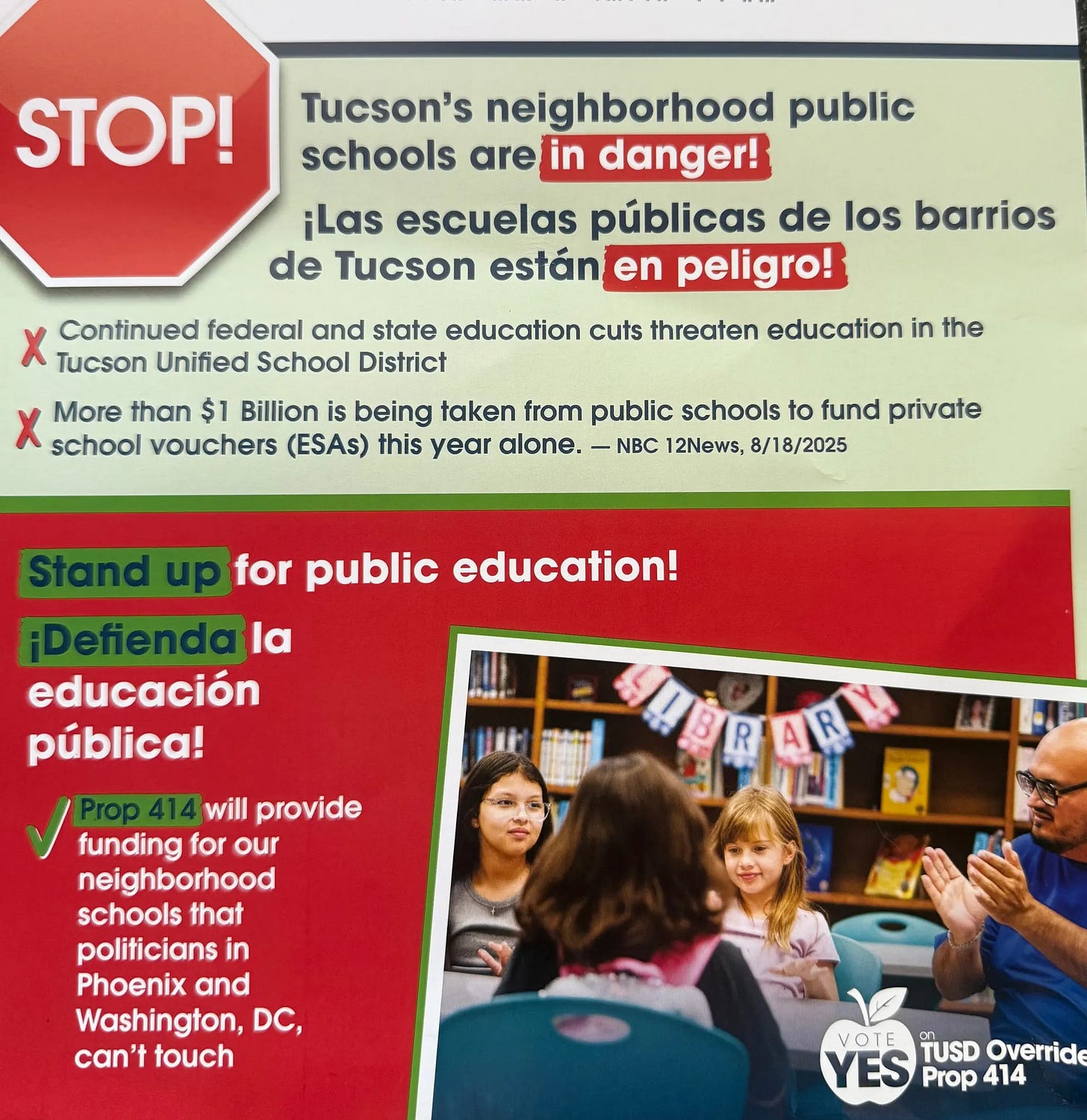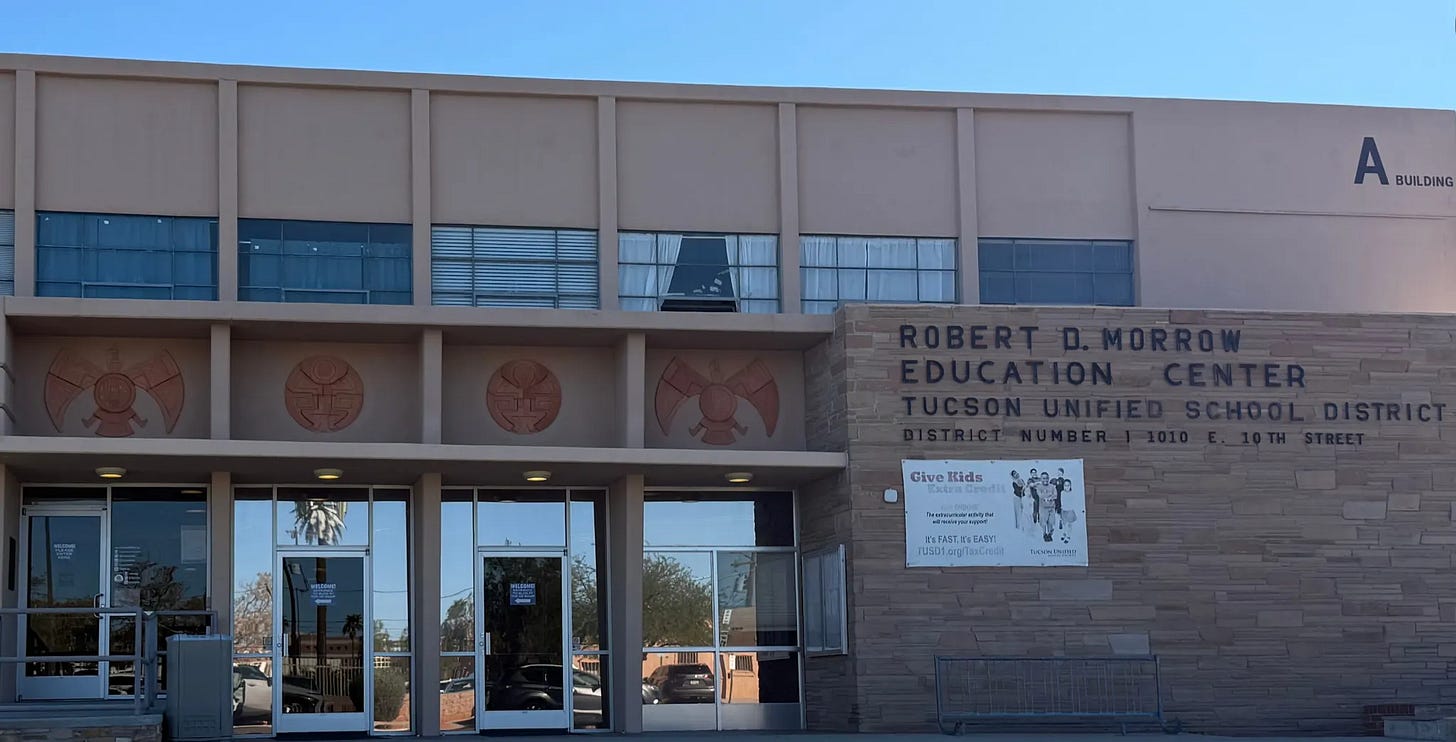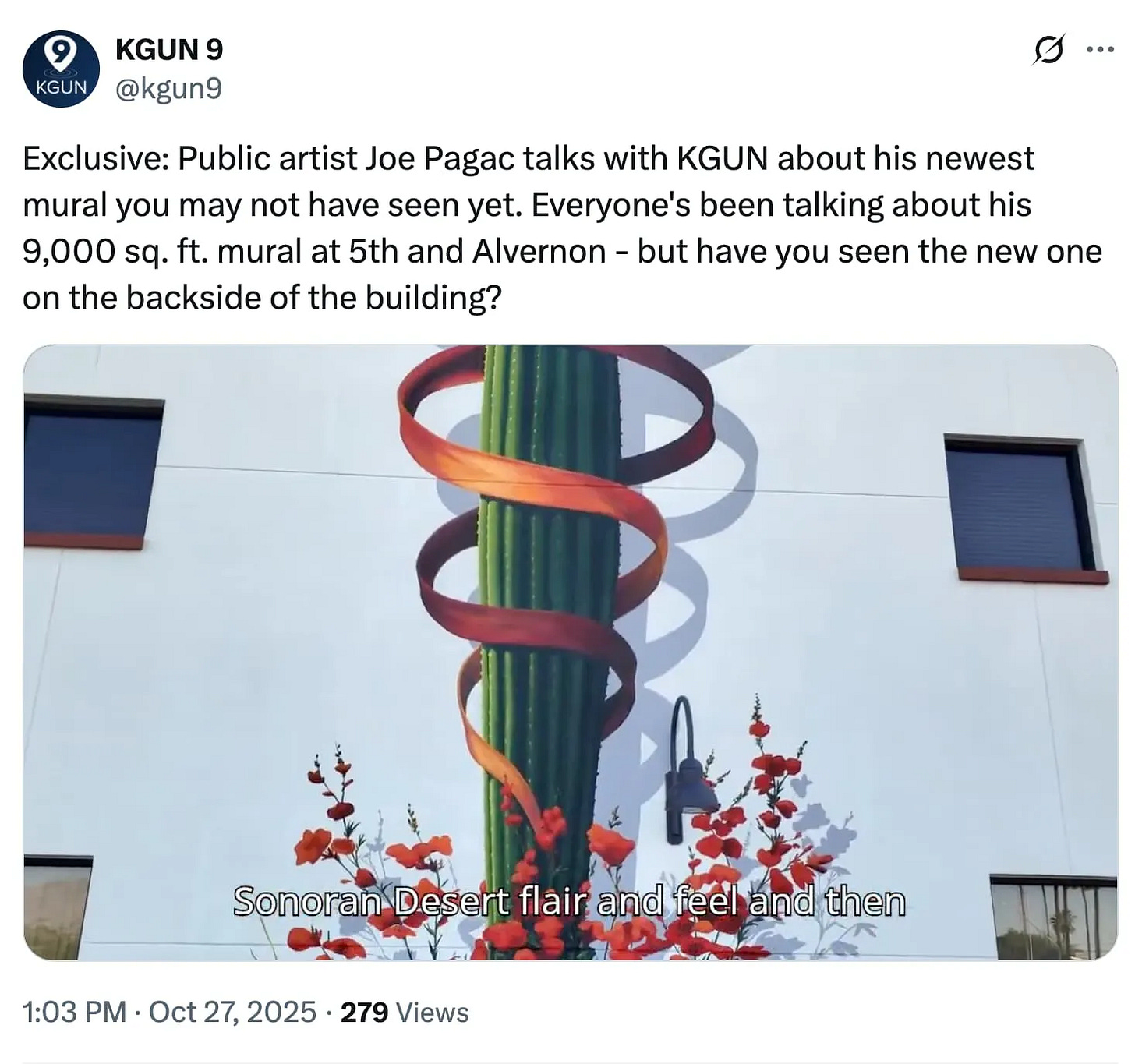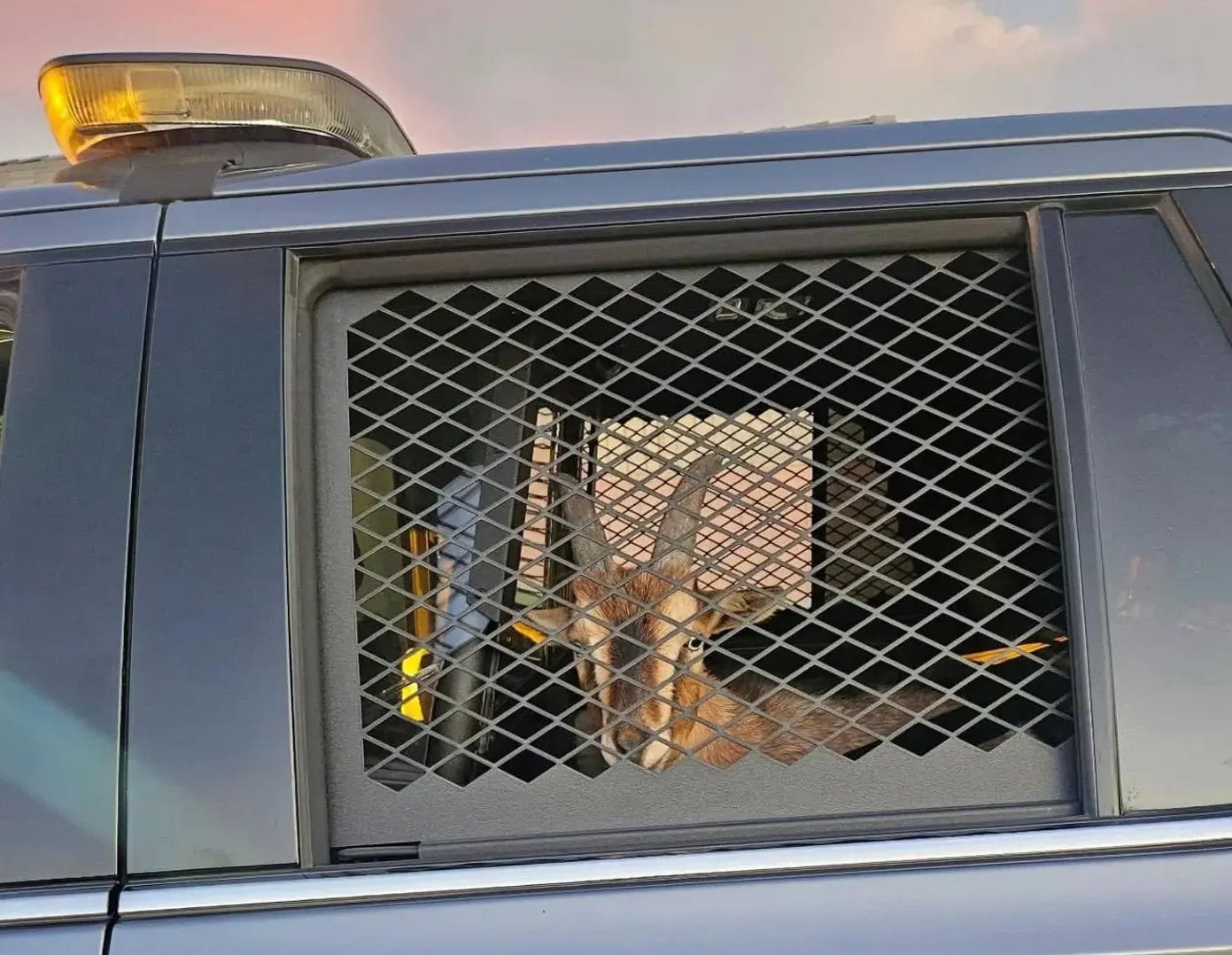Save our schools
Schools ask for help … Project Red, White and Blue needs state approval … And goats might save us.
Good morning, readers!
You can almost hear the school bell ring in today’s edition of the Tucson Agenda.
Three school districts are turning to the community to help fund teachers, programs, security upgrades and equipment repairs. With dwindling support from the state and the feds, schools are looking to locals to keep their doors open.
You have only a week left to weigh in on these propositions, but you can decide to support the Tucson Agenda by becoming a paid subscriber today.
In January, Arizona Gov. Katie Hobbs said in her State of the State Address that the Empowerment Scholarship Account program was a “billion-dollar boondoggle.”
While Hobbs was picking a fight with the Republican-controlled Legislature over putting controls on ESAs, Tucson-area schools were watching closely as they continued to do more with less funding.
It’s no secret that ESAs are a major challenge for public schools. Enrollment is slowly declining in many local schools, while at the same time, districts are forced to grapple with aging infrastructure and emerging security issues.
Revenues simply aren’t keeping up with the costs of running a school district.
Fast-forward to today, and Tucson Unified, Flowing Wells and Sunnyside school districts are asking voters for help to keep the lights on, the buses running, teachers in the classroom, and to make sure campuses remain safe places to work and learn.
TUSD’s Prop. 414
Southern Arizona’s largest school district hasn’t asked for a Maintenance & Operations (M&O) Override in more than 25 years.
TUSD is the only major school district in the greater Tucson region currently without a voter-approved override.
The override in November — better known as Proposition 414 — will ask voters to approve property tax increases to give teachers about $8.1 million in raises, plus another $8.7 million for the rest of the TUSD staff.
It would also pay for more school counselors and social workers, invest in early education programs, and expand career and technical programs like automotive technology, welding, construction, HVAC and culinary arts.
All told, Prop 414 would generate approximately $45 million a year for the cash-strapped district — assuming voters approve the plan.
TUSD Board President Jennifer Eckstrom said dwindling support from the state and federal governments is forcing the district to become more self-reliant, breaking a long-standing funding model for public education.
“Our funding isn’t even keeping up with inflation,” Eckstrom told the Tucson Agenda.

Erika Carter is a TUSD parent, school volunteer and a member of the independent expenditure group Tucsonans for Tucson Public Schools, which is financing a campaign supporting Proposition 414.
Funding cuts have far outstripped the needs of the schools, Carter argued.
“(Current funding levels) just leaves us with such limited funding, with all that TUSD is able to do nothing short of a miracle,” Carter said.
If voters reject the override, Carter said she hopes to avoid the kinds of difficult decisions that other local districts face, like how the Amphitheater School District is considering closing five schools. But without that funding, she can’t make any promises.
Only two people submitted arguments against the override, saying TUSD should cut administration costs and that the request was poorly timed since the Pima County Board of Supervisors had already raised property taxes earlier this year.
“In my opinion, TUSD is one of the worst school systems in the state, and poor management has led to low enrollment and poor graduation and attendance rates on a yearly basis,” wrote Brenda Marts, who signed her letter as an “LD18 Precinct Committeeman.”
We should note that the Democratic-controlled TUSD Governing Board has long been a target of local Republicans.
For a Tucson home assessed at $200,000, homeowners would pay about $205 more in property taxes each year if Proposition 414 passes.
Flowing Wells’ Prop. 415
In the Flowing Wells School District, the board has referred a $30 million modernization bond to voters, known as Proposition 415.
The measure is the culmination of 120 projects designed to improve security, expand early childhood education and update core infrastructure.
Administrators want to expand its successful early childhood program to the north portion of the district, Assistant Superintendent Tamara McAllister said. The program is wildly popular, she noted, and families are on waiting lists to get in.
The bond would also upgrade security by adding carded entry access, new camera systems and shatter-resistant glass in some windows.
If the bond is unpopular, you wouldn’t know it from the county voter guide. While a half-dozen people wrote letters in support of Prop. 415, not a single letter opposed it.
For a Tucson home assessed at $200,000, homeowners would pay about $144 more in property taxes each year if Proposition 415 passes.
Sunnyside’s Prop. 416
The Sunnyside Unified School District is asking voters to approve a $120 million bond to repair its aging campuses.
Rebecca “Beki” Quintero, the Sunnyside School Board President, said that while it might not be obvious from the outside, the bones of many buildings are in dire need of repair.
“When you are 70 years old, things break down,” Quintero said.
A Sunnyside High School alum, Quintero said not much has changed over the years. That’s fine for lockers, but plumbing, HVAC and other systems need replacement before they fail.
The board has set aside $58 million in the bond just for the Sunnyside High School campus.
Like in Flowing Wells, Sunnyside’s Proposition 416 doesn’t have any organized opposition.
For a Tucson home assessed at $200,000, homeowners would pay about $185 more in property taxes each year if Proposition 416 passes.
We’re still going to refer to the proposed AI data centers that could be built on Davis-Monthan Air Force Base by the codename “Project Red, White and Blue.”
We learned on Monday that the $500 billion Trump administration initiative with OpenAI, Oracle, and SoftBank to expand AI infrastructure in the United States on Air Force bases will still need to get approval from the Arizona Department of Water Resources to operate in Arizona.
A caveat in the federal government’s request for proposals is that while the land could be made available for long-term leases, each company would have to secure its own water and power locally.
In the case of Davis-Monthan, that means pumping millions of gallons of water out of the local aquifer.
We heard back from ADWR, and federal military bases within the state are subject to Arizona’s groundwater laws.
And while Davis-Monthan is its own water provider and has some water rights, it still needs ADWR approval to pump more water. Especially if its feeding a thirsty AI data center.
Successful bids for AI data centers on Air Force bases, including Davis-Monthan, are expected to be announced in January.
Failure to communicate: Funding for food stamps will run out in less than a week, and Arizona Gov. Katie Hobbs says the state doesn’t have the money to make up for lost federal dollars, KJZZ’s Kathy Ritchie reports. Roughly 900,000 Arizonans depend on the Supplemental Nutrition Assistance Program and Hobbs says nonprofit social services groups will need to “step up.” Last week, Hobbs appeared surprised that the public wasn’t aware federal funding was running out, per ABC15’s Manuelita Beck. “I thought people knew about this,” she said. Her staff said the Trump administration’s guidance, which came in two weeks ago and state officials didn’t share with the public, was “confusing and unclear.”
Up on the bench: A Trump-appointed judge will oversee the lawsuit that Arizona Attorney General Kris Mayes and Adelita Grijalva filed last week to get Grijalva sworn in, the Republic’s Stephanie Murray reports. U.S. District Court Judge Trevor McFadden will hear the lawsuit, which asks for a way to get around House Speaker Mike Johnson’s reluctance to swear in Grijalva. McFadden is known for his conservatism, but he sided with the Associated Press when President Donald Trump tried to bar the AP from events because it wouldn’t start calling the Gulf of Mexico the “Gulf of America.”
All aboard!: The Tucson Unified School District Governing Board will vote today on a new policy that encourages students to use district transportation to get to school, writes Tucson Sentinel columnist Blake Morlock. The board will also consider extending its current contract with the Tucson Education Association until November 30 as talks between the district and the union continue. Over at Vail Unified, the board is thinking about funneling students in the Rita Ranch subdivision into Cienega High School.
Just in time for summer: Tucson’s Nimbus Brewing Co. is coming back next spring with new owners, the Arizona Daily Star’s Cathalena Burch reports. Scottsdale-based Arizona Brewing Company bought Nimbus in July after Nimbus, known for its Dirty Güera Blonde Ale, ran into financial trouble. The new owners have all the recipes from the former owner, James Counts.
For the price of a six-pack, you can get the best independent journalism in town. Plus, if you click this button, you won’t get a hangover!
It’s that time of year again: If you want your ballot for the November 4 elections to arrive on time, the Pima County Recorder’s Office recommends you mail them in by the end of the day today. If you can’t get to it today, you can always use a ballot drop box or bring it in on Election Day.
A trio of goats painted the town red over the weekend.
They got loose in Marana and ended up roaming around a neighborhood. Police officers eventually caught up with them.
By Saturday, they’d been returned to their owner.
But not before Marana police snapped this pic of a goat looking like a badass in the back of a cruiser.









Today’s edition felt like reading the newspaper again and I felt all the nostalgia. Great work as always!
Between you all, NPR News Hour, and channel 4, I get all the news I can stand! So I can put my energy into action! Thank you!